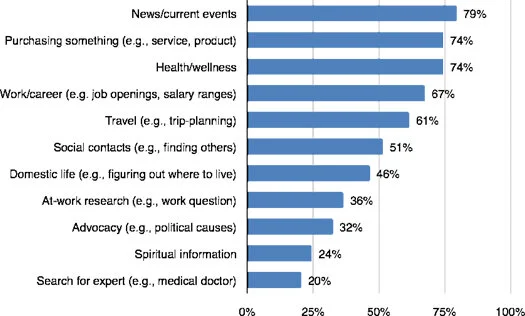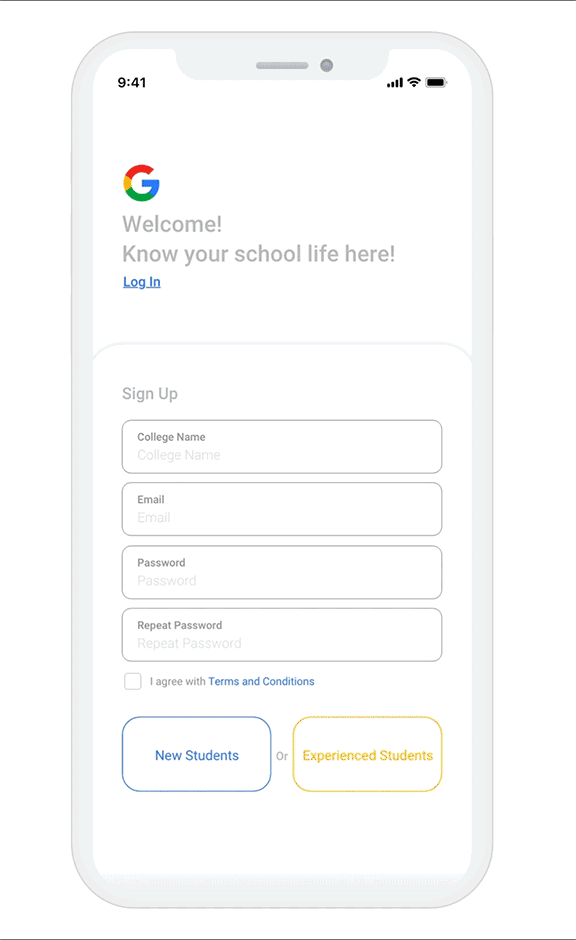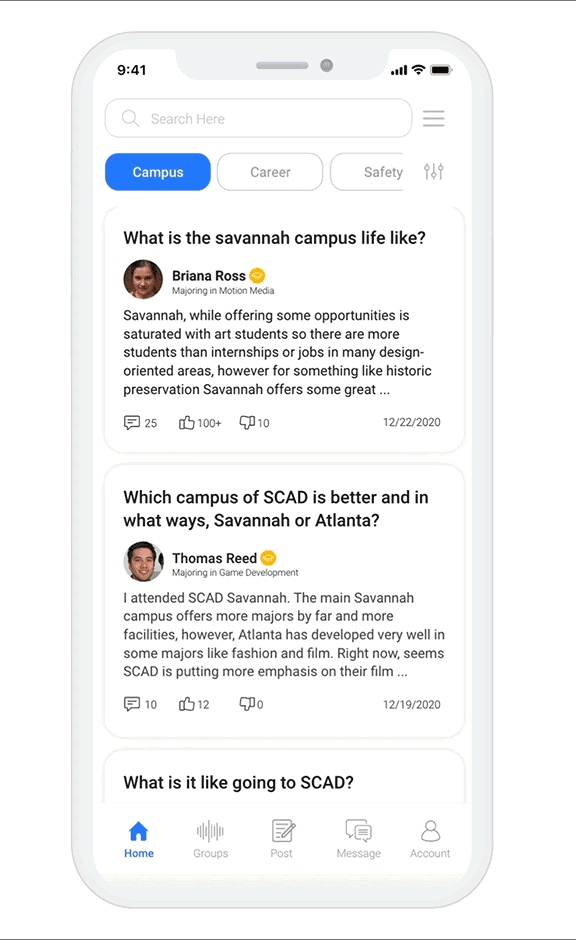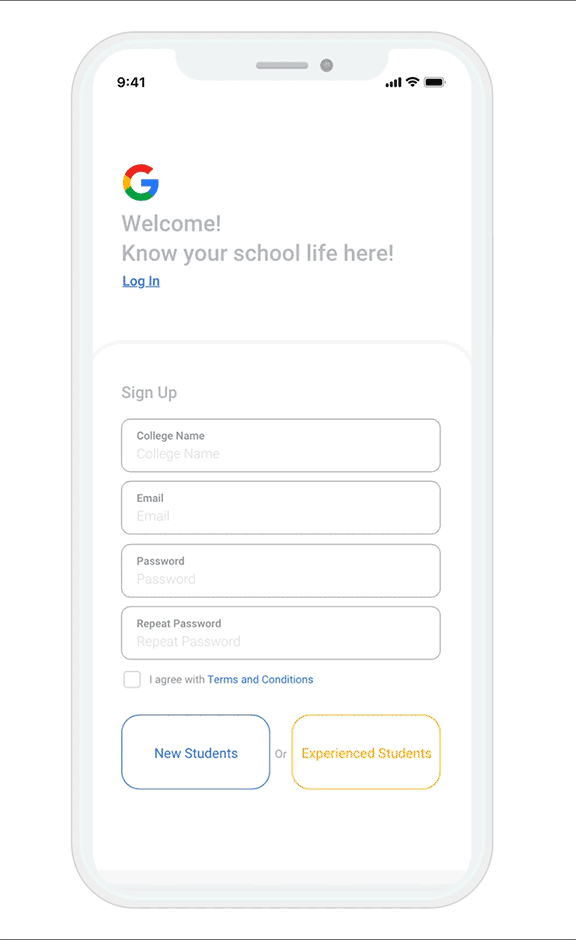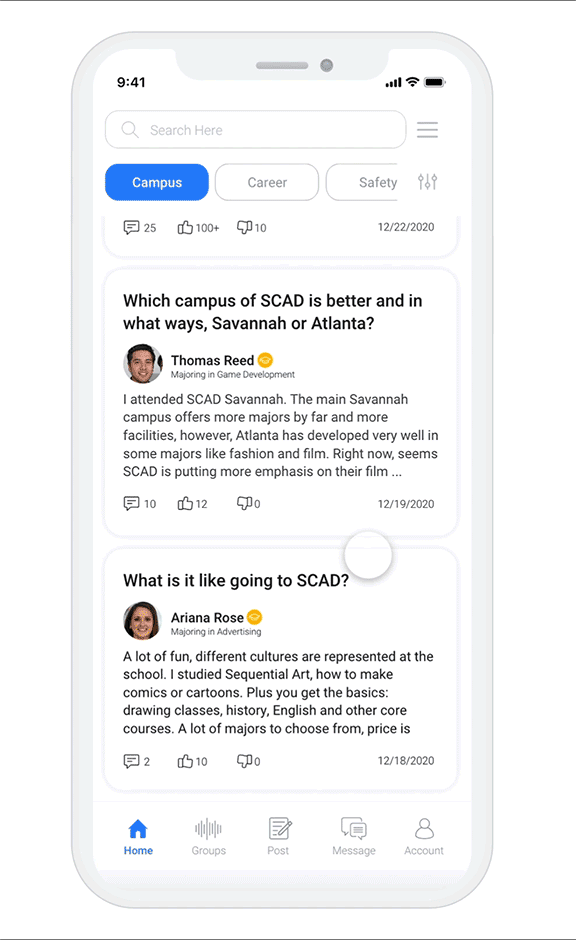
Google 2021 Design Exercise:
Experience for new students
Individual Project
Duration: 5 Days
The challenge
Prompt #2
Your school is gearing up to welcome a new incoming class and would like to help them adjust to campus life. Design an experience that allows new students to ask questions about school life, and experienced students to share answers and advice. Consider the needs of a student who has questions, and the experience for a student who would like to give advice.
Task:
Design an experience that allows new students to ask questions about school life, and experienced students to share answers and advice.
Timeline:
Design Scope:
To identify the design scope, I used the mind map to collect what should I consider in terms of the new students and school life.
I divide the new students into 3 perspectives:
Where the school is?
What is the type of school?
How do new students and experienced students interact with each other currently?
Problem Statement:
Regarding my accessibility and the time constraints, I narrow my design cope to focus on international students and college/university life.
How might we improve the online experience of interaction between incoming international students and experienced students in American Universities?
Research Questions
What is the current interaction between incoming college international students and experienced students?
What do new students want to know about their future campus life?
What kind of advices new students need from experienced students?
What are challenges that new students face when they receiving the advice from experienced students?

SECONDARY RESEARCH
Secondary Research
What personal information needs occur in the daily lives of students?
There are mostly 6 sources students use for everyday life information:
News/Current Events
Purchasing something
Health/Wellness
Work/Career
Travel
Socal contacts
This figure shows information needs arising for respondents within the previous six months. Respondents were asked to “click all that apply.”
What are the tools that students use often to do the research?
These perceptions are evident in teachers’ survey responses: 94% of the teachers surveyed say their students are “very likely” to use Google or other online search engines in a typical research assignment, placing it well ahead of all other sources that we asked about. Second and third on the list of frequently used sources are online encyclopedias such as Wikipedia, and social media sites such as YouTube. In descending order, the sources teachers in our survey say students are “very likely” to use in a typical research assignment:
Google or other online search engines (94%)
Wikipedia or another online encyclopedia (75%)
YouTube or other social media sites (52%)
Their peers (42%)
Spark Notes, Cliff Notes, or other study guides (41%)
*https://www.pewresearch.org/internet/2012/11/01/how-teens-do-research-in-the-digital-world/
What sources do students consult for finding everyday life information?
There are mostly 6 sources students use for everyday life information:
Search engines, including Google
Friends/Family
Wikipedia
Classmates
Personal Collection
Social networks
Results are ranked from the most to the least frequent sources students used for everyday life research within the previous six months. Responses of “almost always,” “often,” and “sometimes” have been conflated into a new category of “use.”
Observation
There are a few websites showing college reviews from experienced students.
Unigo
Unigo is an online website help students find suitable colleges, scholarships, and internships, majors, and careers. It provides college reviews and rating stars from experienced students. —>
Quora
There are limitations in the online community since the people might be not from the college. It is hard for users to identify the right information.

PRIMARY RESEARCH
Primary Research
Survey:
Due to time constraints, I sent out the survey but only get 10 responses from experienced students.
Key Insight:
The top method that experienced students use is social media.
The current experience of experienced students is at an average level.
Interview Quotes
I interview 3 incoming U.S. college Chinese students and 4 experienced students virtually, which allows me to go deeper to understand their personal thoughts.
Quotes from the incoming U.S. College Students:
“I would like to discuss more with alumni since they know more about how the university influences their job seeking.”
“Resource that the college can provide to students is my priority. I don’t worry too much about my campus life, since I need to know how to plan my career path in the future.”
“Reviews from the only community are really subjective, some of the students not from the college might say something bad about it.”
“As a transferring major student, I wonder if I can keep up with other students in a group.”
“Group chat is a good resource for connecting with other experienced students. I used to ask my friends if they know someone studying in the university.”
“I wonder if the quality of the course project matches the criteria of companies requirement. ”
Quotes from the experienced students:
“I didn’t actively write the review on the community, because I think the answers are subjective.“
“New students used to add contacts with me, which does not bother me at all.“
“If our college can host an official panel for the communication between experienced students and new students, I definitely will go there!“
“I prefer online communications (video or audio) since it is very convenient and efficient for us.“
Data Collection (MindMap)
For New Students
After conducting both primary research and secondary research, I noticed that the main needs of new students are from 3 perspectives: Career Life; Academic Life, and Safety.
New Students Journey Map
Experienced Students Journey Map
Opportunity Statement & Design Metrics
A platform allows new students to communicate with experienced students in real-time.
Design Metrics
The design metrics are from two questions:
What does successful interaction between new students and experienced students?
What is the primary action that new students and experienced students have to take to communicate with each other?
Reliable Information: The information provided in my solution has to be accurate and reliable.
Responsive Connection: My solution should provide real-time communication between new students and experienced students.
Sociability: Instead of providing information only, my solution should contain sociability throughout the whole experience.

IDEATION
Ideation
User Flow
Wireframes
User Testing
To test the experienced students’ experience, I did a very quick user testing and got some insightful feedback from the participant.
The bookmark icon is confusing; star or heart might be a better option.
Should change the text “Add “ to “Post. “
“Like and dislike icons” should be close to tittles instead of at the bottom if they work for the question

PROTOTYPING
Hi-Fi Solution
New Students:
Choosing a topic
Checking the questions answer
Posting questions
Attending audio-chat group to talk with experienced students
New Students & Experienced Students:
Attending audio-chat group to talk with experienced students
Experienced Students:
Student ID verification
Experienced Students:
Answering questions online

MY REFLECTION
My Reflection
I reached out to my friends and expand my resources to get more new students to conduct the primary research as much as possible. Since the data is limited, I did not set personas in this project.
Due to time constraints, the research is still limited. I tried my best to go through the whole design process and complete each part as much as possible. I believe that I can enhance this project more if I can have more time to do it.
I use gifs to express the whole interaction among interfaces, which helps viewers to understand the whole flow easily.



